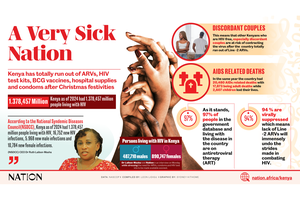Sh4bn drugs in warehouse as HIV patients miss doses

Patients are grappling with a shortage of HIV drugs even as an emergency consignment worth $34 million (Sh4.4bn) has been stored at a warehouse in Nairobi since last year awaiting distribution.
What you need to know:
- The Sh5.24 billion will be used immediately to distribute PEPFAR procured commodities (Sh1.2 billion), maintain the current 11,059 frontline healthcare workers (Sh3.9 billion) and maintenance, software licenses, and updates, system support including personnel (Sh140 million).
- In the 2025/2026 financial year, the 13.54 billion will be used to bridge the commodity gap for PEPFAR withdrawal (Sh7.68 billion), maintain the current 11,059 frontline healthcare workers to ensure business continuity (Sh5.8 billion), support a human resources audit (Sh50 million) and integrate HIV programme systems into the digital health super highway (Sh140 million).
Patients are grappling with a shortage of HIV drugs even as an emergency consignment worth $34 million (Sh4.4bn) has been stored at a warehouse in Nairobi since last year awaiting distribution.
The Nation has learnt that the drugs - dolutegravir and nevirapine prophylaxis- were to be distributed to hospitals nationwide in January.
However, the distribution has been delayed due to a 90-day foreign aid freeze imposed by US President Donald Trump, which took effect on January 20.
The consignment cannot be released because the Ministry of Health is waiting for the National Treasury to allocate Sh1.2 billion for distribution to various counties.
Consequently, the drugs, which are part of the United States President's Emergency Plan for AIDS Relief (PEPFAR), are still at the Mission for Essential Drugs and Supplies warehouse as patients scramble for lifesaving medicine.
Dolutegravir is often used to treat coinfections of HIV and tuberculosis. Nevirapine is part of newborn antiretroviral regimens to prevent perinatal transmission of HIV.
The unavailability of Sh1.2 billion as the reason for the delays in distribution emerged in a presentation by the National Syndemic Diseases Control Council (NSDCC) and the National AIDS & STI Control Programme (NASCOP) during a meeting on Wednesday to discuss the way forward following the USAID funding freeze that has impacted the country’s HIV response programs.
Health Ministry Director General Patrick Amoth explained that there are Sh3.88 billion (USD 30 million) worth of PEPFAR-supported commodities that need to be distributed to health facilities for Kenyans to access lifesaving medicine.
Already, a shortage is biting with Kenyans not getting the drugs in their preferred clinics while other clinics are rationing the drugs for every patient to get.
“I am afraid if the drugs are not released on time, we will have more cases of children being infected. What would be the need to have the drugs in the country if the beneficiaries cannot access them? Why do we have to wait for money rather than saving lives?” Mr Nelson Otwoma, director of the National Empowerment Network of People Living with HIV/AIDS in Kenya, asked.
Kenya has the seventh-largest number of people living with HIV in the world, at around 1.4 million, according to NSDCC. Pepfar funds 40 per cent of Kenya's HIV drugs and supplies.
He adds: “Let the government take care of procurement and distribution of HIV commodities to be sustainable and to stop confusing the people who depend on these drugs.
In the meeting, the participants agreed that a cabinet memo would be developed to ensure the allocation of money from the supplementary budget towards the distribution. A letter would be released by the Ministry of Health to facilitate the release of the commodities from the warehouse.
However, according to a UNAIDS report published on February 9, 2025, a cabinet memo “to mitigate the situation had already been developed by MOH.”
The report, titled “Impacts of U.S. pause of foreign assistance on global AIDS programmes in Kenya” mentions that the distribution of PEPFAR-supported products had been paused, waiting for further guidance.
“All requests to distribute PEPFAR-supported products in the country through USAID are on hold until further guidance is provided to unfreeze the initial communication. Products that were to be distributed in January 2025 under USAID/PEPFAR include ARVs (Nevirapine syrup, Dolutegravir 10 mg and 50 mg). For these products, health facilities had a stock balance between 2 to 4 months by 31st December 2025,” says the report.
“The country may start experiencing erratic supply of Nevirapine syrup and Dolutegravir (DTG) 50 mg towards the end of March and May 2025, respectively, if the stop work order is not lifted. The current stocks at Kenya Medical Supplies Authority (KEMSA) for DTG 10 mg will sustain the country beyond June 2025,” the report says.
It further adds: “Viral load and early infant diagnosis (EID) products are mainly procured through PEPFAR support. This will be adversely affected if the stop order is not lifted as soon as possible as the quantity under the Global Fund is minimal, targeting specific point-of-care testing sites.
As of 2024, 98 per cent of the approximately 1.4 million people living with HIV know their status, 98 per cent are on treatment, and 94 per cent have achieved viral suppression.”
The USAID stop-work order has left a gap in HIV management in the country with the county governments now calling on the national government to allocate an extra Sh31 billion to fill the gap.
The Council of Governors said the money will cater to the four most impacted areas, including health products and technologies, payment of staff who provide HIV services across 40 counties, management of electronic medical record systems, and services for high-risk populations.
The most affected areas include health care workforce in HIV services which the USAID contributed Sh5.8 billion HIV, Tuberculosis(TB), Malaria health products and technologies (Sh12.26 billion), other health products and technologies including medical oxygen, laboratory and cervical cancer (Sh3.7 billion) and country distribution costs of commodities supported by the US government (Sh2.26 billion).
The gap has also impacted data systems, which used to depend on USAID for Sh139 million, blood and blood products (Sh2.7 billion), family planning (Sh598 million), nutrition (Sh2.88 billion), and vaccines (Sh585 million).
The US Government was directly supporting 40,608 staff across 40 counties, except Isiolo, Garissa, Mandera, Lamu, Tana River, Marsabit, and Wajir. Following the withdrawal, 1.4 million patients living with HIV across the 40 counties will be impacted, with a total loss of over Sh20 billion.
The counties that were most impacted due to the number of staff they were supporting, and salaries lost include Nairobi, the most affected with 8,803 staff, and a loss of Sh3.915 billion.
Others include Kisumu (3,759 staff, and a loss of Sh1.651 billion), Homa Bay (3,282 staff and a loss of Sh1.419 billion), Siaya (2,490 staff and a total loss of Sh1.092 billion). The rest are Migori (3,268 staff, loss of Sh 938 million), Mombasa (2,292 staff, loss of Sh853 million), and Kiambu (2,982 staff, loss of Sh784 million).
Kisumu, Homa Bay, and Migori Counties, which bear the highest burden of people living with HIV, have also been impacted, with the withdrawal affecting a total of 351,339 people living with the condition, needing a total of about Sh5.27 billion. These three counties are now calling on the national government to increase their allocations in the next financial year.
In a joint meeting between the Council of Governors, Ministry of Health, National Syndemic Diseases Control Council, National AIDS, STI Control Programme (NASCOP), and the National Assembly Health Committee, without the presence of the National Treasury Cabinet Secretary John Mbadi, it was resolved that county governments would receive an additional Sh5.24 billion this financial year, drawn from the emergency fund, while an additional Sh13.54 billion would be allocated from the 2025/2026 financial year.
The additional funds would cater to the payment of staff, vaccines, HIV commodities, and health management systems.
The Sh5.24 billion will be used immediately to distribute PEPFAR procured commodities (Sh1.2 billion), maintain the current 11,059 frontline healthcare workers (Sh3.9 billion) and maintenance, software licenses, and updates, system support including personnel (Sh140 million).
In the 2025/2026 financial year, the 13.54 billion will be used to bridge the commodity gap for PEPFAR withdrawal (Sh7.68 billion), maintain the current 11,059 frontline healthcare workers to ensure business continuity (Sh5.8 billion), support a human resources audit (Sh50 million) and integrate HIV programme systems into the digital health super highway (Sh140 million).






